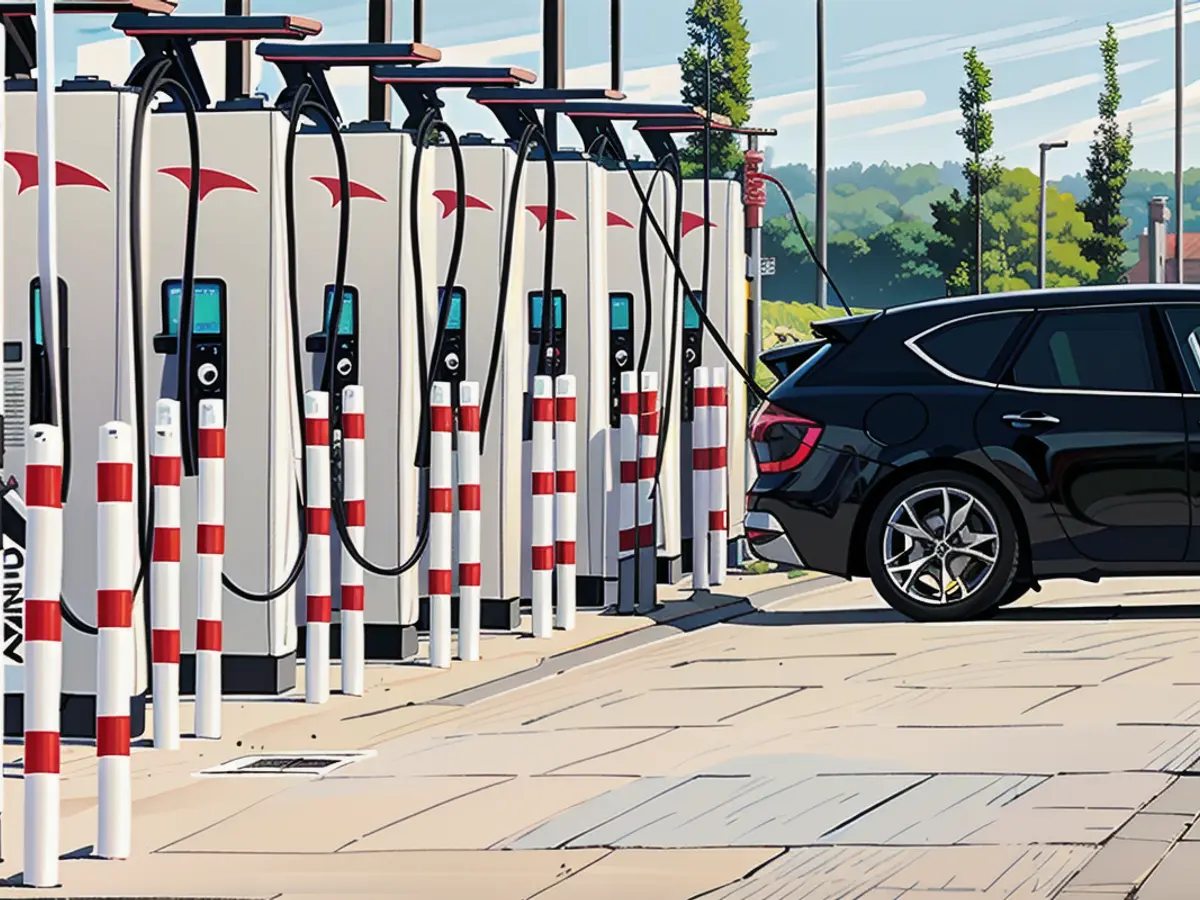Germany engages in an illusive discussion surrounding electric cars.
The growing call to cancel the ban on combustion engines is gaining momentum. However, Stefan Bratzel, an industry insider, believes that backing away now would only make things worse for the automotive sector. The real issue is not whether electromobility will triumph, but how.
The CDU/CSU aims to scrap the planned 2035 phasing out of combustion engines, and even the EU Commission President Ursula von der Leyen is openly questioning it. The FDP keeps pushing for e-fuels, while BMW's Oliver Zipse calls an adjustment inevitable. Mercedes intends to halt the development of its all-electric production line, where all components and machinery were to be redesigned. Instead, they plan to keep manufacturing cars with combustion engines and electric drives on the same production line. Does this signal the end of combustion engines and electromobility? Stefan Bratzel, the head of the Center of Automotive Management at the University of Applied Sciences in Bergisch Gladbach, doesn't think so; he sees it more as a mistake the government should rectify as soon as possible.
"The suspension of the environmental bonus for electric cars has really shocked everyone," Bratzel told ntv.de, referring to both customers and manufacturers. Slowing down the growth of the electric cars market in Germany has consequently affected sales, with new registrations declining by 29% in March. Struggling sales pressure manufacturers' profits, even for pricier models. Dropping Mercedes' all-electric line effort might be a result of this.
However, Bratzel doubts Mercedes can achieve the required technological advancements without a purely electric platform. "German manufacturers need highly competitive models, especially for the vital Chinese market," he says. The range and weight must be correct "to create buyer excitement."
Bratzel doesn't believe in a reversal of the 2035 ban on combustion engines, citing the call for a smarter process based on CO2 reduction targets instead. He considers the aggressive stance towards the ban led to a strong defensive response from the public and adds that it's wrong to overturn the ban now. "If we do, people might think we don't need to change," he says.
Bratzel isn't a proponent of the complete ban on combustion engines by 2035, but rather the implementation of more intelligent strategies like CO2 reduction targets. The "ideologically charged justification" for the ban has led to strong criticism. However, he maintains that it wouldn't be wise to reverse the ban now. "That would give the impression we don't need to change course."
Bratzel emphasizes that discussions about technological alternatives are a false narrative and there are no better options for cutting CO2 emissions in line with climate goals. "Hydrogen is crucial for the steel industry, for example, where there is no replacement. E-fuels are more theoretical. Individuals could drive them, but there's not enough supply for the mass market." In his view, the cost of both alternatives is too high. "Electromobility is more efficient," he insists. "It will win the race."
Bratzel believes the talk about charging infrastructure isn't the problem, as long as governments set clear targets. He returned from Shanghai, where he observed that "every second car on the road is an electric car - it works." In Bratzel's opinion, this is more of a "phantom debate" happening in Germany: "We're discussing if it works instead of how it works." He suggests the focus should be on government regulations, such as commitments from energy providers to lay down the necessary power lines alongside charging station installations.
Bratzel stresses the need for speedier government approval of fast-charging stations in densely populated city areas. "In China, you can see that this works in large cities," he observes. "It's not helpful to wait; we must ramp up electrification through political orchestration." The traffic light coalition doesn't seem to agree. "The cacophony must stop," Bratzel demands.
Finally, Bratzel recommends governments support electromobility more aggressively with cost incentives. "The combustion engine must become more expensive so that using an e-car is cheaper than a petrol or diesel one. We need to exert political pressure," he asserts. According to statistical calculations, charging on the road is currently more costly than refueling a combustion-engine car. "We need to take action."
The automobile specialist fails to identify any technical issues. Progress is happening swiftly. Soon, batteries may be charged as rapidly as gas is filled up. Case in point, CATL revealed a battery boasting a 1000-kilometer range this year, capable of powering 600 kilometers in just ten minutes. Germany is up against a massive race to catch up in battery cell technology, the expert insists.
Potential Threat: Dependence on China
"It's crucial we don't slack off now," urges Bratzel, even if it's undecided whether all vehicles will run on electricity two or three years later than initially predicted. In his opinion, the German government should focus solely on the promotion of electric cars. Meanwhile, German auto manufacturers must reduce costs throughout the supply chain, bringing the prices for electric vehicles closer to those of conventional ones. "The current electric models are technically impressive, yet still too costly." In his view, there's room for cost cuts in cell production, design, manufacturing, and raw materials.
"Chinese producers have been working on this for quite some time, which accounts for their ability to produce more affordably," the expert explains. Research suggests that battery cell costs per kilowatt hour are declining. "We need to make sure it's not only China that achieves success." To that end, German car manufacturers must minimize costs and heighten innovation. If they don't, they'll become severely reliant on China.

Read also:
- Lack of snow also opens up new opportunities for winter tourism
- Abrupt end to e-car subsidies
- The chemical industry has little confidence
- Intersport boss hopes for sales boom through sporting events
Despite the discord surrounding electric cars in Germany, German carmakers like BMW and Mercedes are still investing in combustion engine vehicles and electric drives. However, Bratzel believes this strategy could hinder their ability to create highly competitive models for the Chinese market, which is crucial for CO2 reduction.
The debate over electromobility in Germany is focused more on infrastructure and cost concerns rather than the feasibility of electric cars. Bratzel suggests that governments should prioritize clear regulations, such as commitments to install necessary power lines alongside charging station installations, to accelerate the transition to electromobility.
Source: www.ntv.de








